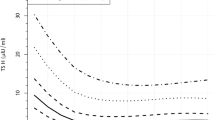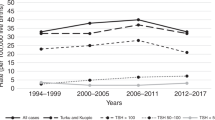Abstract
Objective
To evaluate the role of serial newborn screening of congenital hypothyroidism using thyroxine (T4) in the neonatal intensive care unit (NICU).
Subjects
Newborn screen results were reviewed from a single academic NICU during 2007–2016 (n = 6100). Thyroid function levels were reviewed in patients treated for hypothyroidism during that period. Duration of treatment was followed after discharge.
Results
Overall incidence of treated hypothyroidism was 1:103 with increasing incidence inversely related to birth weight. Among treated infants (n = 59), initial newborn screen demonstrated sensitivity and specificity of 74.1% and 84.9%, respectively; second screen demonstrated rates of 85.7% and 76.1%, respectively. Based on follow-up data, prevalence of permanent congenital hypothyroidism in our NICU population was 1:870 (n = 7); two patients would have been missed with a single screen.
Conclusion
Abnormal T4 on newborn screening is common for preterm neonates. Higher rates of permanent congenital hypothyroidism highlight the need for screening beyond the newborn screen.
This is a preview of subscription content, access via your institution
Access options
Subscribe to this journal
Receive 12 print issues and online access
$259.00 per year
only $21.58 per issue
Buy this article
- Purchase on Springer Link
- Instant access to full article PDF
Prices may be subject to local taxes which are calculated during checkout


Similar content being viewed by others
References
Mitchell ML, Hsu H, Sahai I, the Massachusetts Pediatric Endocrine Work Group. The increased incidence of congenital hypothyroidism: fact or fancy? Clin Endocrinol. 2011;75:806–10.
Bongers-Schokking JJ, Schopman W. Thyroid function in healthy normal, low birthweight and preterm infants. Eur J Pedia. 1984;143:117–22.
Hashimoto H, Sato T, Horita S, Kobu M, Ohki T. Maturation of the pituitary-thyroid axis during the perinatal period. Endocrinol Jpn. 1991;38:151–7.
Biswas S, Buffery J, Enoch H, Bland JM, Walters D, Markiewicz M. A longitudinal assessment of thyroid hormone concentrations in preterm infants younger than 30 weeks’ gestation during the first 2 weeks of life and their relationship to outcome. Pediatr. 2002;109:222–7.
Franklin RC, Puride GL, O’Grady CM. Neonatal thyroid function: prematurity, prenatal steroids, and respiratory distress syndrome. Arch Dis Child. 1986;61:589–92.
LaFranchi S. Thyroid function in the preterm infant. Thyroid. 1999;9:71–78.
Williams FLR, Ogston SA, van Toor H, Visser TJ, Hume R. Serum thyroid hormones in preterm infants: associations with postnatal illnesses and drug usage. J Pedia Endocrinol Metab. 2007;90:5954–63.
Clemente M, Ruiz-Cuevas P, Carrascosa A, Potau N, Almar J, Salcedo S, et al. Thyroid function in preterm infants 27–29 weeks of gestational age during the first four months of life: results from a prospective study comprising 80 preterm infants. J Pedia Endocrinol Metab. 2007;20:1269–80.
Carrascosa A, Ruiz-Cuevas P, Clemente M, Salcedo S, Almar J. Thyroid function in 76 sick preterm infants 30–36 weeks: results from a longitudinal study. J Pedia Endocrinol Metab. 2008;21:237–44.
Ryckman KK, Spracklen CN, Dagle JM, Murray JC. Maternal factors and complications of preterm birth associated with neonatal thyroid stimulating hormone. J Pedia Endocrinol Metab. 2014;27:929–38.
Filippi L, Cecchi A, Tronchin M, Dani C, Pezzati M, Seminara S, et al. Dopamine infusion and hypothyroxinemia in very low birth weight preterm infants. Eur J Pedia. 2004;163:7–13.
Olivieri A, Fazzini C, Medda E. Italian study group for congenital hypothyroidism. Horm Res Paediatr. 2015;83:86–93.
Drummond-Borg M, Johnson D. Newborn screening for congenital hypothyroidism: the Texas experience. Tex Med. 2003;99:50–52.
American Academy of Pediatrics, Rose SR, American Thyroid Association, RS, Lawson Wilkins Pediatric Endocrine Society. Update of newborn screening and therapy for congenital hypothyroidism. Pediatr. 2006;117:2291–303.
Mandel SJ, Hermos RJ, Laron CA, Prigozhin AB, Rojas DA, Mitchell ML. Atypical hypothyroidism and the very low birthweight infant. Thyroid. 2000;10:693–5.
Korzeniewski SJ, Kleyn M, Young WI, Chaiworapongsa T, Schwartz AG, Romero R. Screening for congenital hypothyroidism in newborns transferred to neonatal intensive care. Arch Dis Child Fetal Neonatal Ed. 2013;98:F310–315.
Bijarnia S, Wilcken B, Wiley VC. Newborn screening for congenital hypothyroidism in very-low-birth-weight babies: the need for a second test. J Inherit Metab Dis. 2011;34:827–33.
Ford GA, Denniston S, Sesser D, Skeels MR, LaFranchi SH. Transient versus permanent congenital hypothyroidism after age 3 years in infants detected by the first vs. second newborn screening test in Oregon. Horm Res Paediatr. 2016;86:169–77.
McGrath N, Hawkes CP, Mayne P, Murphy NP. Optimal timing of repeat newborn screening for congenital hypothyroidism in preterm infants to detect delayed thyroid-stimulating hormone elevation. J Pedia. 2019;205:77–82.
Silva SA, Chagas AJ, Goulart EM, Silva GA, Marçal LV, Gomes MN, et al. Screening for congenital hypothyroidism in extreme premature and/or very low birth weight newborns: the importance of a specific protocol. J Pedia Endocrinol Metab. 2010;23:45–52.
Srinivasan R, Harigopal S, Turner S, Cheetham T. Permanent and transient congenital hypothyroidism in preterm infants. Acta Paediatr. 2012;101:e179–182.
Kaluarachchi DC, Colaizy TT, Pesce LM, Tansey M, Klein JM. Congenital hypothyroidism with delayed thyroid-stimulating hormone elevation in premature infants born at less than 30 weeks gestation. J Perinatol. 2017;37:277–82.
Adams LM, Emery JR, Clark SJ, Carlton EI, Nelson JC. Reference ranges for newer thyroid function tests in premature infants. J Pedia. 1995;126:122–7.
Imamoglu EY, Gursoy T, Hayran M, Karatekin G, Ovali F. Nomogram-based evaluation of thyroid function in appropriate-for-gestational-age neonates in intensive care unit. J Perinatol. 2015;35:204–7.
Gruñeiro-Papendieck L, Chiesa A, Mendez V, Santilli A, Prieto L. Efficacy of congenital hypothyroidism neonatal screening in preterms less than 32 weeks of gestational age: more evidence. J Pedia Endocrinol Metab. 2005;18:373–7.
CLSI. CLSI document I/LA31-A.. Newborn screening for preterm, low birth weight, and sick newborns; approved guideline. Wayne, PA: Clinical and Laboratory Standards Institute; 2009.
Léger J, Olivieri A, Donaldson M, Torresani T, Krude H, van Vliet G, et al. European society for paediatric endocrinology consensus guidelines on screening, diagnosis, and management of congenital hypothyroidism. Horm Res Paediatr. 2014;81:80–103.
LaFranchi S. Screening preterm infants for congenital hypothyroidism: better the second time around. J Pedia. 2014;164:1259–60.
Schmidt JL, Castellanos-Brown K, Childress S, Bonhomme N, Oktay JS, Terry SF, et al. The impact of false-positive newborn screening results on families: a qualitative study. Genet Med. 2012;14:76–80.
Acknowledgements
We would like to thank our collaborators at the Texas Department State Health Services for their assistance.
Author information
Authors and Affiliations
Contributions
TF designed the study, drafted the project proposal, coordinated with IRB, collected data, drafted and approved final paper as submitted. AS was involved in design of the study, collected data, and drafted and approved final paper as submitted. CB performed data analysis, drafted and approved the final paper as submitted. AK was involved in designing of the study, reviewed and approved final paper as submitted.
Corresponding author
Ethics declarations
Conflict of interest
The authors declare that they have no conflict of interest.
Additional information
Publisher’s note: Springer Nature remains neutral with regard to jurisdictional claims in published maps and institutional affiliations.
Rights and permissions
About this article
Cite this article
Findley, T.O., Shah, A., Bell, C. et al. The value of serial newborn screening for congenital hypothyroidism using thyroxine (T4) in the neonatal intensive care unit. J Perinatol 39, 1065–1071 (2019). https://doi.org/10.1038/s41372-019-0400-3
Received:
Revised:
Accepted:
Published:
Issue Date:
DOI: https://doi.org/10.1038/s41372-019-0400-3



